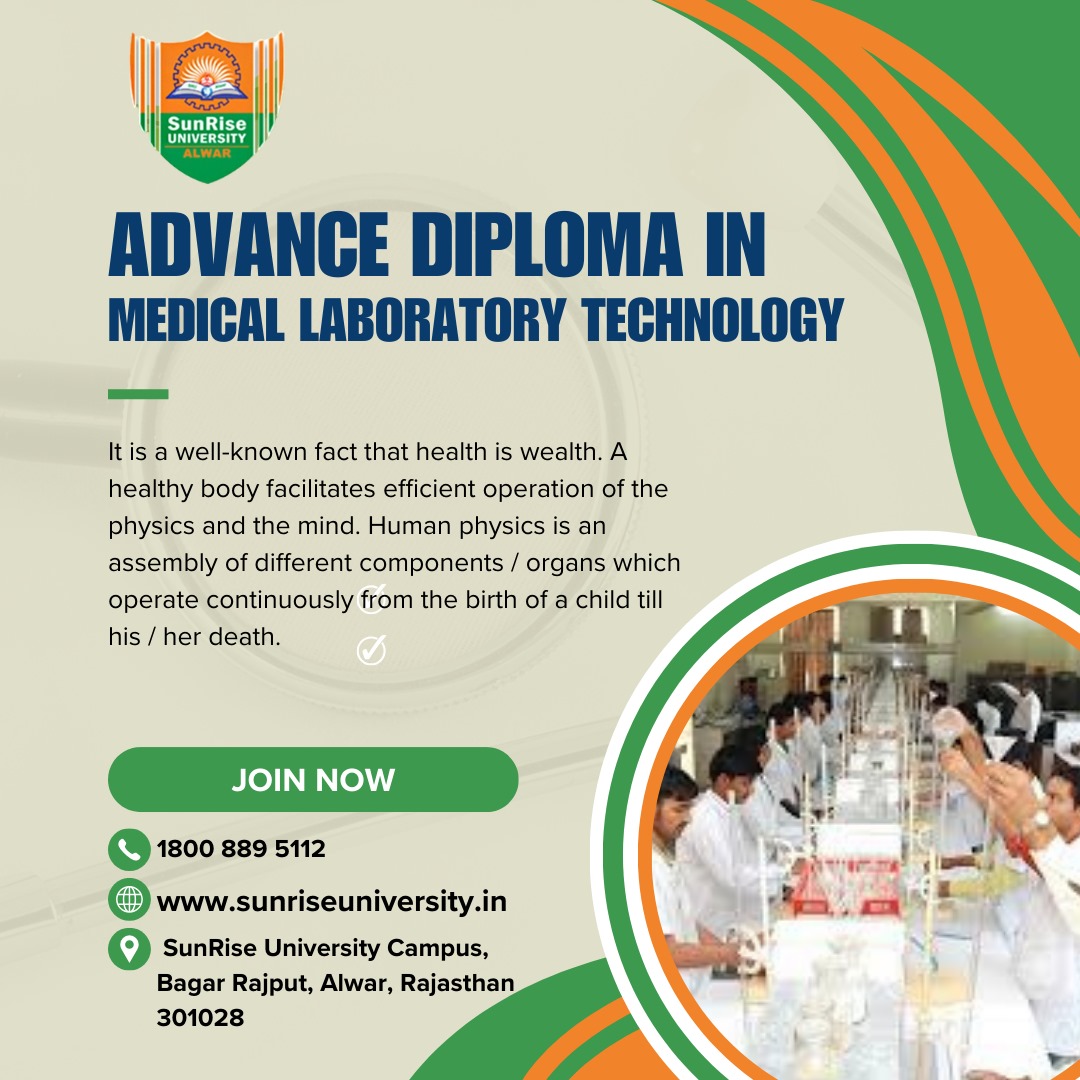Introduction about Advanced Diploma in Medical Laboratory Technology
Sunrise University: Advanced Diploma in Medical Laboratory Technology
Introduction, Admission, Eligibility, Duration
An Advanced Diploma in Medical Laboratory Technology (MLT) is a comprehensive program designed by the best University of India to equip students with the necessary knowledge and skills to work effectively in medical laboratories. This advanced diploma course typically builds upon foundational concepts introduced in a basic diploma or certificate program in MLT.
The program often includes theoretical instruction along with extensive hands-on laboratory training to ensure students develop proficiency in performing various laboratory tests and procedures. Students also learn about laboratory safety protocols, ethical considerations, and regulatory requirements governing medical laboratory practices.
How can I apply for admission to the Advanced Diploma in Medical Laboratory Technology?
-
Research Programs: Begin by researching different institutions or colleges that offer Advanced Diploma programs in Medical Laboratory Technology. Look for accredited institutions with a strong reputation in healthcare education.
-
Review Admission Requirements: Each institution may have specific admission requirements. Common requirements may include a high school diploma or equivalent, prerequisite courses in biology, chemistry, and math, as well as possibly some clinical experience or relevant work experience.
-
Prepare Necessary Documents: Gather all required documents for the application process. This may include transcripts from previous educational institutions, letters of recommendation, a personal statement or essay, and any other documents specified by the institution.
-
Submit Application: Complete the application form provided by the institution. Make sure to fill out all sections accurately and completely. Pay attention to deadlines for submission.
-
Entrance Exams: Some institutions may require you to take entrance exams such as the SAT, ACT, or other standardized tests. Make sure to prepare for these exams if they are required.
-
Interview (if applicable): Some institutions may require an interview as part of the application process. Prepare for this by researching the program, understanding why you want to pursue this field, and practicing common interview questions.
-
Financial Aid: If you need financial assistance, research and apply for scholarships, grants, or loans. Many institutions offer financial aid to eligible students.
-
Wait for Admission Decision: After submitting your application, wait for the institution to review your materials and make an admission decision. This process may take several weeks to months depending on the institution.
-
Acceptance and Enrolment: If you are accepted into the program, you will receive an acceptance letter. Follow the instructions provided to confirm your enrolment, pay any necessary deposits, and register for classes.
-
Orientation: Attend any orientation sessions offered by the institution to familiarize yourself with the program, campus resources, and other important information.
What is the eligibility for the Advanced Diploma in Medical Laboratory Technology?
The eligibility criteria for an Advanced Diploma in Medical Laboratory Technology (MLT) can vary depending on the institution offering the program. However, here are some general eligibility requirements that are commonly observed:
1. Educational Qualifications: Typically, candidates must have completed their high school education or an equivalent qualification from a recognized board or institution.
2. Academic Background: Some institutions may require candidates to have a background in science subjects such as Biology, Chemistry, and Physics at the high school level.
3. Minimum Marks: There might be a minimum requirement for marks obtained in the qualifying examination, which varies from institution to institution.
4. Entrance Exam: Some institutes may conduct an entrance examination to assess the candidate's aptitude and knowledge in relevant subjects.
5. Age Limit: There may be an age limit specified by the institution for admission to the program.
6. Other Requirements: Depending on the institution, there might be additional requirements such as medical fitness certificates or language proficiency tests.
How long does it take to complete an Advanced Diploma in Medical Laboratory Technology?
The duration of an Advanced Diploma in Medical Laboratory Technology program at the best University of India can vary depending on the educational institution and the specific curriculum they offer. Typically, such programs may last anywhere from 1 to 3 years. Some programs may be more intensive and shorter in duration, while others may be part-time or have additional requirements that extend the duration of study. It's best to check with the institution offering the program for specific information on the duration and structure of their Advanced Diploma in Medical Laboratory Technology program.
Internship opportunities after the Advanced Diploma in Medical Laboratory Technology?
1. Hospital Laboratories: Many hospitals offer internships or training programs for medical laboratory technicians. You could gain experience in areas such as clinical chemistry, hematology, microbiology, and immunology.
2. Diagnostic Laboratories: Private diagnostic laboratories often provide internship opportunities for students to gain hands-on experience in performing various diagnostic tests under the supervision of experienced professionals.
3. Research Laboratories: If you're interested in research, you could look for internship opportunities in research laboratories affiliated with universities, hospitals, or pharmaceutical companies. Here, you might assist in conducting experiments, analysing data, and contributing to research projects.
4. Public Health Laboratories: Government-run public health laboratories may offer internships focused on public health initiatives, such as disease surveillance, outbreak investigation, and environmental health testing.
5. Blood Banks: Internships in blood banks can provide experience in blood typing, cross-matching, and ensuring the safety of blood products for transfusion.
6. Biotechnology Companies: Companies involved in biotechnology, pharmaceuticals, and medical device manufacturing may offer internships in areas such as quality control, product development, and regulatory affairs.
7. Veterinary Laboratories: If you're interested in animal health, consider internships at veterinary diagnostic laboratories where you can assist in diagnosing diseases in animals.






